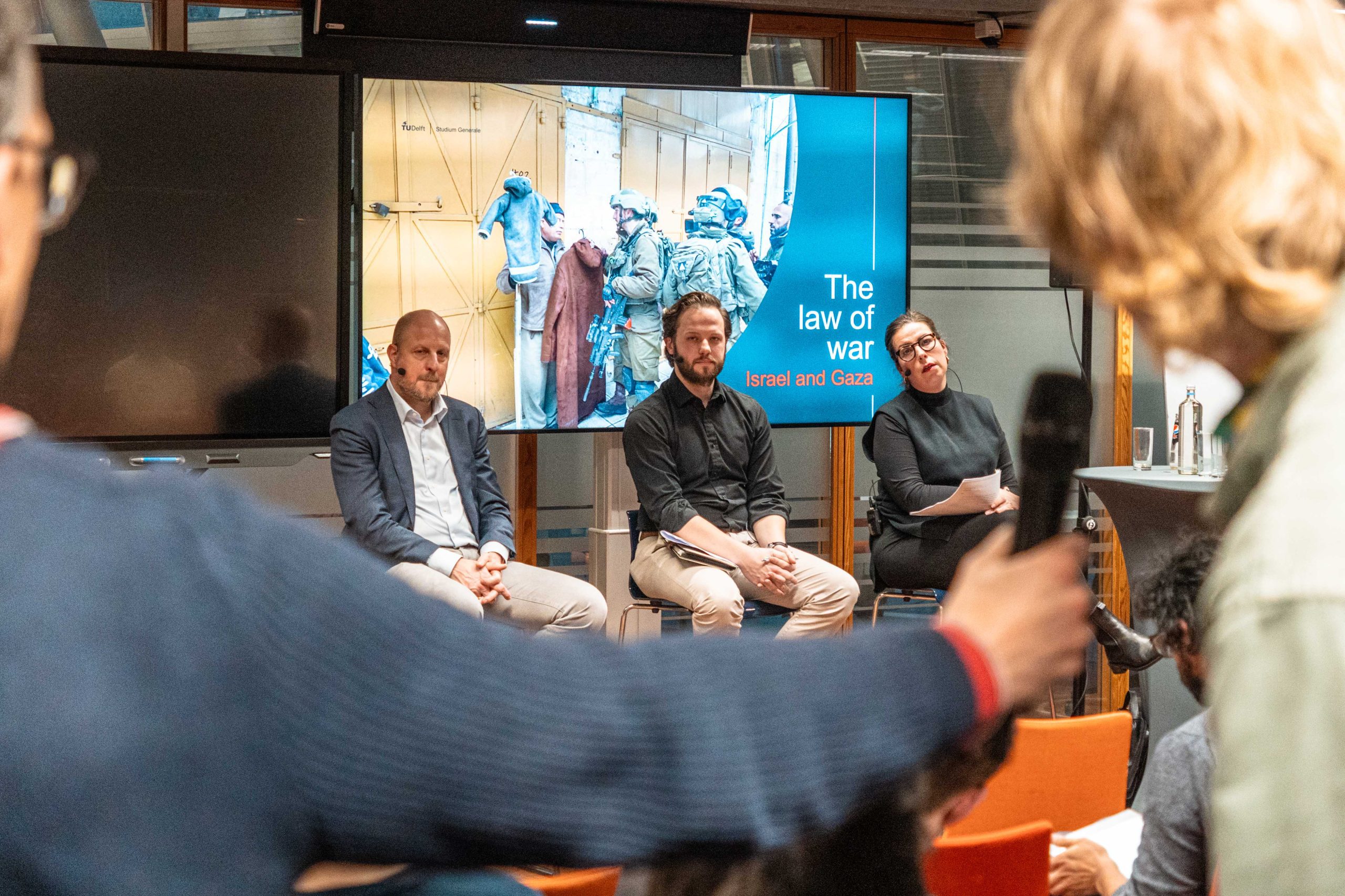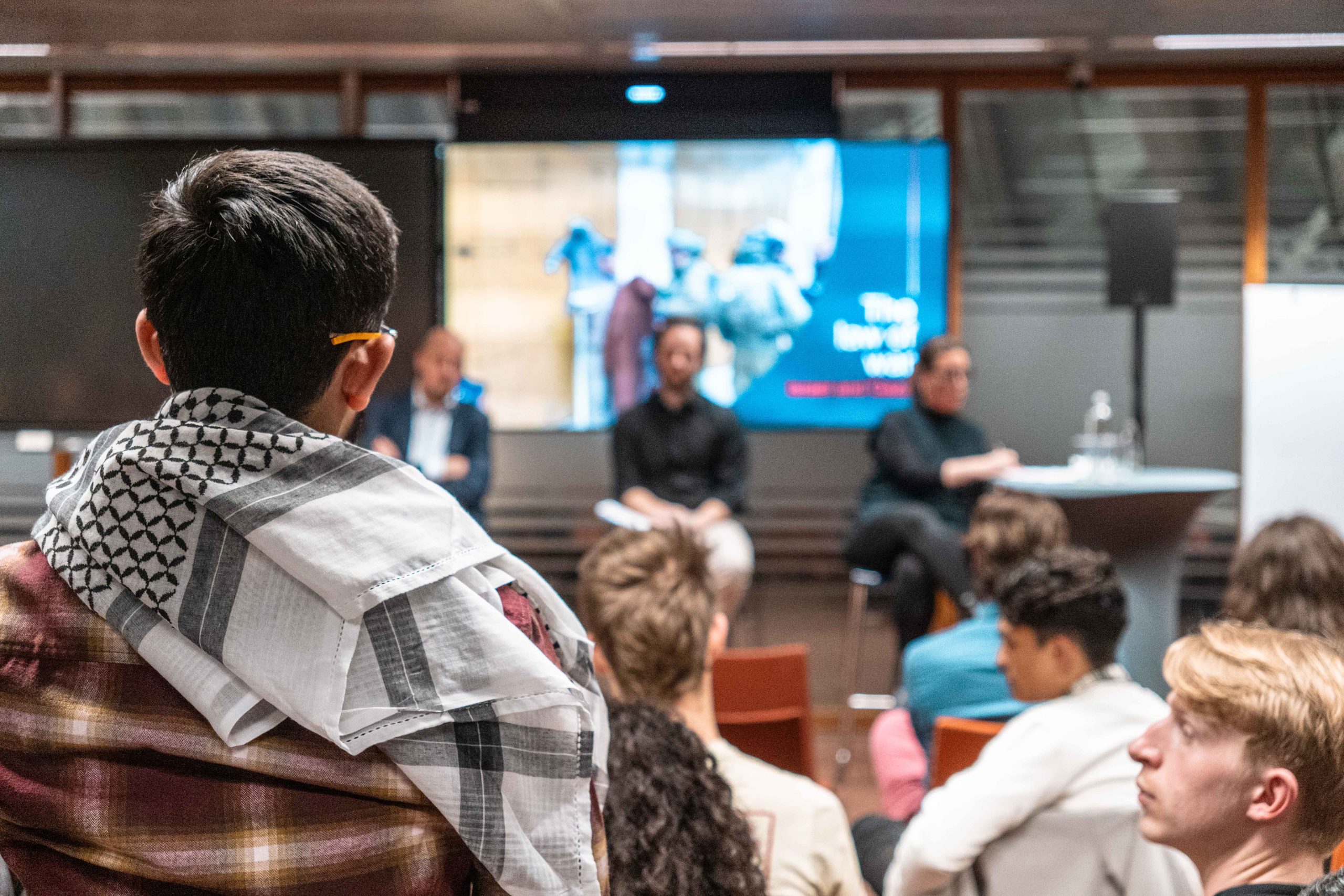After giving it much thought, Studium Generale held a panel discussion about Gaza on 29 February. There was no taking sides, it was an academic discussion on international law. Delta was there too.
The panel discussion entitled The Law of War: Israel and Gaza. (Photo: Thijs van Reeuwijk)
The receptionists at the Library were busy. A little after 17:00 on 29 February, a leap year, one visitor after the other asked where they could find the Orange Room. In this room, behind a plain door in the blue back wall of the central hall, 70 chairs are ready for a panel discussion in a session called The Law of War: Israel and Gaza.
It is the first Studium Generale event held on this subject since the start of the war following Hamas’ attack on 7 October. Studium Generale worked with student Begüm Sari on the organisation. Along with the Engineering Solidarity Palestine Delft, she has organised two ‘teach-ins’ and one ‘walk-out’ over the last few months.
Quiet
While the opinions at the previous teach-ins about Gaza sometimes varied widely, the Head of Studium Generale, Leon Heuts, was not afraid of disturbances, he says, “but we did discuss it beforehand and also consulted security”. Marieke Sjerps, who worked with Heuts on the event programme, also saw that there were some tense reactions. Even the district police officer changed the time of his shift so that he could come and check things out, she says, but when he saw that things were going peacefully on Thursday, he left.
‘The law is actually a tool for emotions, for justice’
Sjerps explains that the event intentionally covered the judicial side of the conflict: “This is tangible and an issue about which you can have a good substantive discussion. In principle, everyone in the Netherlands is pro human rights and pro the relevant institutions, but that does not mean that we all know how they work.” It is also easier to discuss laws than feelings, she says, but that does not mean that they are unrelated. “The law is actually a tool for emotions, for justice.”
A crash course on international human rights
She invited three speakers to quickly introduce the audience to the laws and agreements that may apply to the situation in Gaza and Israel, and how these can be enforced. Each speaker is given 15 minutes, after which there is plenty of time for questions from the audience.

The first speaker is Marten Zwanenburg, Professor of Military Law at the University of Amsterdam and the Netherlands Defence Academy. One crash course on international humanitarian law later, the audience knows why, from a legal perspective, it is important to determine whether Gaza has been under Israeli occupation over the last few years, and how to ensure that people and states adhere to international laws.
The second speaker, Iva Vukusic, Assistant Professor on International History at Utrecht University, goes into the issue of enforcement in greater depth. She explains the difference between the International Court of Justice (“That’s the building that looks like a castle”) and the International Criminal Court (“That’s the one that looks like a corporate headquarters”), both in The Hague, and “What their role will be in providing some justice – and I want to emphasise ‘some’ – in this utterly desperate, tragic situation.”
The last speaker is Dirk Jan Jalvingh, Policy Advisor at Oxfam Novib. This non-governmental organisation sees what is currently playing out in Gaza in terms of judicial theory. Oxfam has about 30 staff members there, he says, but their work is extremely difficult given the continuing violence and the largely closed border. Jalvingh believes that the Dutch Government could help. There is a policy, only the political will to do something is lacking.
‘Until there is a sort of official statement issued by TU Delft that expresses solidarity with Palestinians, I will not feel safe to speak out’
When it is time for the public to ask questions, there are plenty of them. Members of the audience ask the panel members about a range of aspects and applications of international law. One of them refers to the statement of the court in The Hague that the Netherlands should stop exporting F-35 parts (in Dutch) by asking “I wonder if a legal case is a possibility in the situation where a knowledge institution that has linkages with a state transfers knowledge with that state”. Zwanenburg replies that “I don’t totally exclude the possibility, but I think it will be very, very difficult.”
TU Delft could do more
After the panel discussion, there was the opportunity to stay and talk, which not everyone does. Bastiaan van Dijk, a Nanobiology student, quickly dons his jacket and cap. “I’m going to see some friends. I asked them to come, but they did not want to discuss this issue. I think it’s good to talk about these kinds of things with each other.” Van Dijk is pleased that these kinds of events are held as he believes that universities too play a role ‘in shaping world citizens’. This panel discussion is thus ‘a good start’, but, in his eyes, TU Delft could do more.
This is also the opinion of two other people present who have family ties with Palestine. “Personally, I would have liked it more if the speakers were more passionate about it,” says one of them (their names are known to the Editorial Office), “but you’re talking about a cause that has either been misrepresented or underrepresented for almost 80 years now, so these are definitely steps in the right direction.”
His friend standing next to him is concerned about his career. “Until there is a sort of official statement issued [by TU Delft] that expresses solidarity with Palestinians, I will not feel safe to speak out,” he says. There are big differences, including among people with Palestinian backgrounds, the first person says. “I’m not too much afraid for my career or studies. I’m just afraid for my family. That’s more important than a career.”
Do you have a question or comment about this article?
E.S.Beinema@tudelft.nl


Comments are closed.